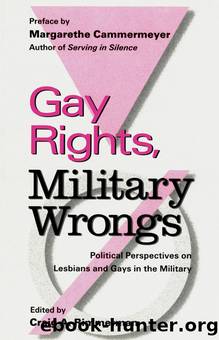Gay Rights, Military Wrongs: Political Perspectives on Lesbians and Gays in the Military by Craig A. Rimmerman

Author:Craig A. Rimmerman [Rimmerman, Craig A.]
Language: eng
Format: epub
Tags: Social Science, LGBTQ+ Studies, Gay Studies
ISBN: 9780815325802
Google: Go9XsJ47GswC
Goodreads: 6223284
Publisher: Routledge
Published: 1996-01-15T09:25:39+00:00
Mobilized âPublic Opinionâ and the Religious Right
Public opinion is more obsessively cited in Washington than in any other national capital, and indicators of public sentiment more closely scrutinized in explaining policy choices than anywhere else. Yet there are clear variations across issue areas in attentiveness to that opinion. On major economic issues that affect the climate of investment, for example, gauges of public sentiment are sporadically sought and modestly weighted. In the conduct of foreign relations and military policy in general, public opinion is either only casually considered or thought to accord wide latitude to policy makers. Gay-related issues are firmly lodged within that category of issues which provoke close attention to public opinion or mobilized opinion. In respect to attitudes both in the general public and among those people moved to communicate to Congress, opponents of Clintonâs plan to lift the ban had considerable advantages.
Although survey evidence has indicated a large and slowly growing majority of Americans favoring equal rights for lesbians and gays, a clear majority also âdisapproveâ of homosexuality.90 A 1988 electoral survey found that Americans felt more negatively toward lesbians and gays than toward any other social group asked about, including illegal aliens.91 The moral disapproval is to some extent rooted in perceptions of religious doctrine, and also in persistent stereotypes about sexual predation and child molestation. The persistence of prejudice, combined with a widespread reluctance to talk about sexuality in general and sexual difference in particular, creates the potential for considerable volatility in public sentiment about specific issues. The relatively recent arrival of gay rights issues onto public agendas exaggerates that volatility, and creates room for protagonists in debate to shape public perceptions.
Public opinion surveys on the issue of gays in the military provide striking evidence of volatility. Polls taken between 1977 and 1991 showed an increase in public support for allowing gays to serve, from 51 percent to 69 percent, this at a time when the ban on their serving was total.92 But by the time of the late January firestorm, one similarly worded poll found that support for gays being allowed to serve had fallen to 47 percent, and three others showed a slide down to the low 40s.93
A number of Capitol Hill insiders have talked of public opinion as a major problem for politicians sorting out the issue of the gay ban. Some emphasized that removing the gay ban was simply not a high priority for people in their districts.94 What lay behind this sentiment is the belief that ardent support for gay rights was largely restricted to a small minority that was all but invisible in most parts of the country. This view was routinely accompanied by the belief that there was also deep seated popular antipathy to homosexuality. In other words, there were more opponents who cared about the issue than proponents.
The same judgment would once have been made about abortion, but politicians tend to see opinion as both more negative and more volatile on the subject of homosexuality. On
Download
This site does not store any files on its server. We only index and link to content provided by other sites. Please contact the content providers to delete copyright contents if any and email us, we'll remove relevant links or contents immediately.
Spell It Out by David Crystal(36110)
Life for Me Ain't Been No Crystal Stair by Susan Sheehan(35805)
Cecilia; Or, Memoirs of an Heiress — Volume 1 by Fanny Burney(32549)
Cecilia; Or, Memoirs of an Heiress — Volume 2 by Fanny Burney(31948)
Cecilia; Or, Memoirs of an Heiress — Volume 3 by Fanny Burney(31932)
The Great Music City by Andrea Baker(31917)
Professional Troublemaker by Luvvie Ajayi Jones(29651)
The Secret History by Donna Tartt(19059)
We're Going to Need More Wine by Gabrielle Union(19036)
Twilight of the Idols With the Antichrist and Ecce Homo by Friedrich Nietzsche(18626)
All the Missing Girls by Megan Miranda(15965)
Cat's cradle by Kurt Vonnegut(15339)
Pimp by Iceberg Slim(14489)
Bombshells: Glamour Girls of a Lifetime by Sullivan Steve(14060)
For the Love of Europe by Rick Steves(13949)
Norse Mythology by Gaiman Neil(13350)
Talking to Strangers by Malcolm Gladwell(13350)
Fifty Shades Freed by E L James(13233)
The Social Justice Warrior Handbook by Lisa De Pasquale(12187)
